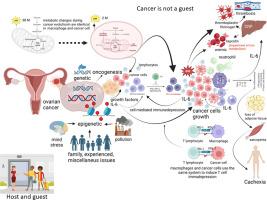癌症不是客人
IF 5
2区 医学
Q2 Medicine
引用次数: 0
摘要
Swaton 等人最近在《细胞》(Cell)杂志上发表了一篇题为 "拥抱癌症的复杂性:系统疾病的标志"(Embracing Cancer Complexity: Hallmarks of Systemic Disease)的文章,提出了癌症是宿主体内发展的客人这一观点。他们讨论了机体内肿瘤细胞失调的可能原因和事件,并强调了恶病质和血栓形成等事件。然而,我们认为,要更好地理解与癌症相关的现象,就不能将癌症视为客人。实际上,癌症是在环境中诞生、发展和扩散的。它并非来自外部,而是利用其生存的同一系统来推动其死亡计划。事实上,今天我们知道,癌症不仅会在受影响的器官中引起局部症状,还会导致全身症状,这就是与癌症相关的炎症的证据。炎症对于控制抗药性阶段的肿瘤发生和肿瘤增殖至关重要,而抗药性阶段正是免疫系统展示其有效性的关键时刻。但是,如果免疫系统造成免疫病理损伤,则可能导致坏死,最终进入耐受期,从而引发全身症状。了解了这些现象,就能彻底解释晚期肿瘤患者的血栓性疾病、贫血、肌少症和铁代谢紊乱。在这种情况下,微环境的概念就有了不同的含义。在耐受阶段本应与癌症对抗的细胞,现在却参与了一个自我维持的过程,有利于癌症的生长及其死亡计划。准确了解这些机制是治疗癌症及其相关症状的一种更现代的转化方法。本文章由计算机程序翻译,如有差异,请以英文原文为准。

Cancer is not a guest
In a recent article titled "Embracing Cancer Complexity: Hallmarks of Systemic Disease" published in Cell, Swaton et al. propose the idea of cancer as a guest that develops within a host. They discuss the possible causes and events of neoplastic cell dysregulations within an organism, highlighting events such as cachexia and thrombosis. However, we believe that to understand cancer-associated phenomena better, cancer cannot be considered a guest. In reality, cancer is born, develops, and spreads within its environment. It does not come from outside but instead uses the same system in which it lives to promote its death plan. Indeed, today we know that cancer not only causes local symptoms in the affected organ but also leads to systemic symptoms, which are evidence of inflammation associated with cancer. Inflammation is vital in controlling oncogenesis and neoplastic proliferation during the resistance phase, which is a critical moment for the immune system to demonstrate its effectiveness. However, if the immune system causes immunopathological damage, it may lead to necrosis and eventually to the tolerance phase, which can result in systemic symptoms. Understanding these phenomena thoroughly explains thrombophilia, anemia, sarcopenia, and iron metabolism disruption in advanced-stage neoplastic patients. The concept of the microenvironment takes on a different meaning in this context. The same cells that should oppose cancer in the tolerance phase now participate in a process that self-maintains, favoring the growth of the cancer and its death plan. The exact knowledge of these mechanisms is a more modern translational approach to treating cancer and its related symptoms.
求助全文
通过发布文献求助,成功后即可免费获取论文全文。
去求助
来源期刊

Translational Oncology
ONCOLOGY-
CiteScore
8.40
自引率
2.00%
发文量
314
审稿时长
54 days
期刊介绍:
Translational Oncology publishes the results of novel research investigations which bridge the laboratory and clinical settings including risk assessment, cellular and molecular characterization, prevention, detection, diagnosis and treatment of human cancers with the overall goal of improving the clinical care of oncology patients. Translational Oncology will publish laboratory studies of novel therapeutic interventions as well as clinical trials which evaluate new treatment paradigms for cancer. Peer reviewed manuscript types include Original Reports, Reviews and Editorials.
 求助内容:
求助内容: 应助结果提醒方式:
应助结果提醒方式:


